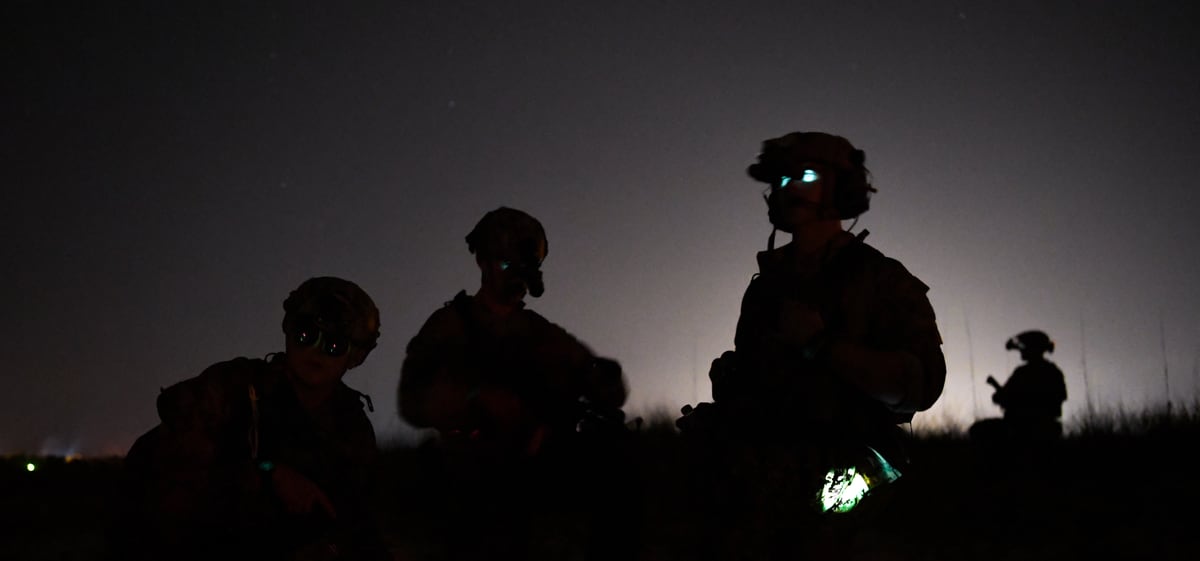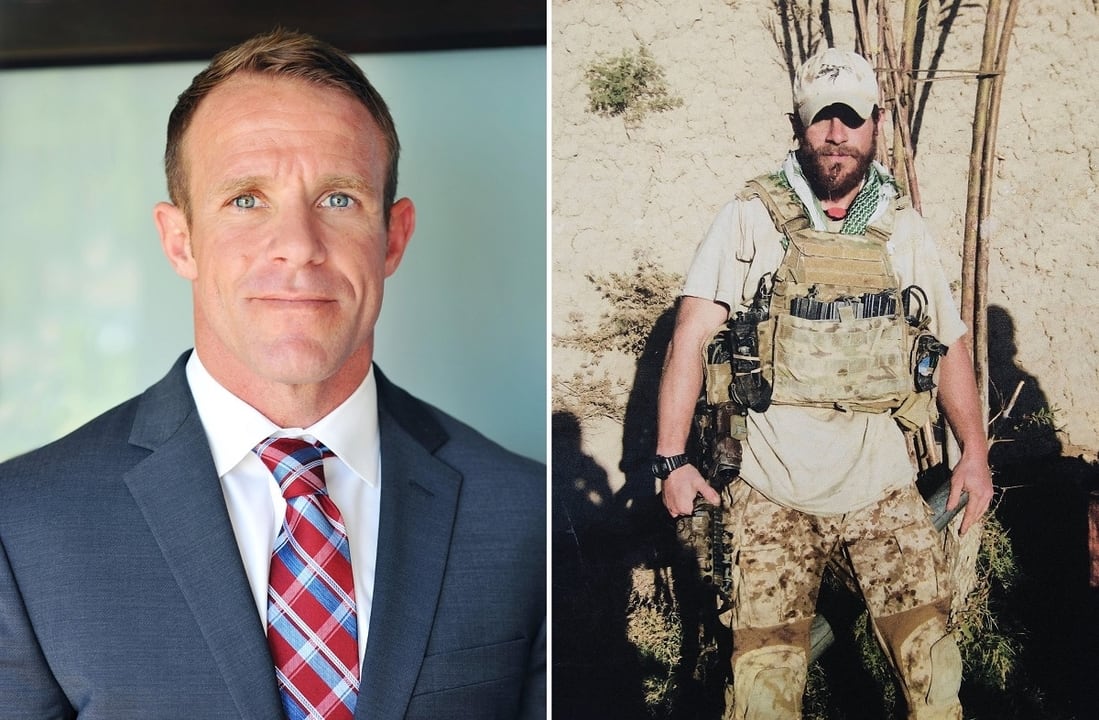Military officials are prepared to call nearly a dozen past and present Navy SEALs to testify in the case of one elite Navy commando accused of fatally stabbing an Islamic State detainee in Iraq last year, according to documents obtained by Navy Times.
The records related to the Naval Criminal Investigation Service’s probe offer new insight into the probe that will be aired publicly when the case against Chief Special Warfare Operator Edward “Eddie” Gallagher goes to an Article 32 hearing Wednesday morning in San Diego.
The documents suggest that military officials have obtained cellphone text conversations showing Gallagher allegedly sought to cover up the fatal stabbing. The records also show that a different special operator may be acting like a mole for federal investigators by attempting to talk to another petty officer who has lawyered up and invoked his right to silence.
Military prosecutors have also accused one of Gallagher’s commissioned officers, Lt. Jacob “Jake” Portier, of allegedly covering up the war crimes, but authorities have not scheduled an Article 32 hearing for him.
The trove of documents given to Navy Times shows that at least nine active-duty SEALs at Coronado-based Naval Special Warfare Group 1 and one of their fellow commandos who recently left the service gave sworn statements and provided videotaped interviews about Gallagher, 39, to NCIS agents.
Federal agents arrested Gallagher on Sept. 11 and incarcerated him in San Diego’s Naval Consolidated Brig Miramar.
After allegedly murdering the ISIS fighter near the Iraqi city of Mosul on May 3, 2017, Gallagher mugged in a photo next to the body, performed a re-enlistment service next to the dead man and operated an aerial drone over him, too.
Gallagher also faces a pair of aggravated assault charges tied to a pair of alleged shootings of a noncombatant man and woman during the same deployment there, plus three obstruction of justice specifications tied to what prosecutors contend was an ongoing plot to cover up the alleged war crimes.
There are two separate specifications for allegedly abusing Tramadol Hydrochloride, a pain reliever, and unlawfully possessing Sustanon-250, an anabolic steroid.
The evidence includes graphic images and digitally-recorded footage from Iraq, according to the internal records.
RELATED

Some of the files show an ongoing battle between Gallagher’s legal team — led by civilian military defense attorneys Colby Vokey, of Dallas, and Phillip Stackhouse, of San Diego — and military prosecutors over forcing the past and present special operators to testify in open court at Wednesday’s Article 32 hearing.
Despite acknowledging that 10 of the SEALs very likely could provide “relevant” details about Gallagher’s alleged crimes, the prosecutors indicated that they will make only one witness available — NCIS Special Agent Joseph Warpinski.
Warpinski declined to comment on the case when contacted by Navy Times, instead referring all questions to Navy public affairs officials.
In a written statement emailed to Navy Times, Naval Special Warfare public affairs officer Cmdr. Tamara Lawrence said that she was “not going to comment on documents I haven’t seen or that were leaked to the media.”
“We have a responsibility to protect the rights of ALL individuals involved in this matter,” she continued. “That leak violates the integrity of the process. That leaked information lacks context. The government will not litigate its case in the media. The government will present its case at the Article 32 hearing. Any leaked information may have effects beyond just what you are asking, so I won’t comment any further, other than refer you to my previously provided statements.”
Because of the clandestine work of the commandos overseas and the dangers they and their families face from terrorists, Navy Times already had assured Naval Special Warfare officials that the names of SEALs will not be published unless the government releases the information to the public.
Prosecutors contend that another SEAL, who wasn’t present for any of the alleged war crimes in Iraq, later received text message from Gallagher that were designed to cover it all up. The SEAL who received the text messages has not been charged with a crime, but he has apparently hired an attorney and invoked his right to remain silent, according to the records.
The documents also suggest that another senior enlisted SEAL leader might have allegedly heard Gallagher discuss the war crimes, but prosecutors also want to bar him from appearing at the Article 32 hearing.
RELATED

They’ve defended keeping witnesses from testifying by arguing Gallagher’s hearing is limited in scope and only should be used to display enough probable cause to justify criminal charges.
Even testimony that’s relevant to the defendant “would be cumulative and unnecessary” for a limited hearing, they contend.
“The prosecutors' gamesmanship denying witnesses is an insult to a just and fair hearing,” Stackhouse told Military Times. “If they wanted them to testify, they would have them there.”
Stackhouse has pressed for a speedy trial, declaring that the sooner his client is exonerated the better.
A ruling on whether the SEAL witnesses will appear in court is expected to be decided by the hearing officer on Wednesday. All potential witnesses have been advised that they might be compelled to testify at the proceedings, according to other files provided to Navy Times.
Another potential witness, Lt. Portier, won’t appear there because he’s hired defense counsel and invoked his right to silence after the Navy charged him with violating four articles of the Uniform Code of Military Justice, including failure to obey an order or regulation, conduct unbecoming an officer and a gentleman, and making a false statement.
RELATED

Fellow SEALs joined Portier’s civilian defense attorney, Jeremiah J. Sullivan III, in telling Navy Times that the lieutenant actually was the first officer in the unit to report allegations of war crimes up the chain of command and they’ve expressed fears that he’s being prosecuted unfairly.
Navy Times obtained copies of the written gag orders that prohibit Sullivan, Vokey, Stackhouse and military co-counsels from revealing details about the case. Signed by Capt. Matthew D. Rosenbloom, the Group 1 commodore, the orders bar everyone connected to the Portier and Gallagher cases from sharing with witnesses the evidence compiled by NCIS.
Rosenbloom argues that all the materials are “extremely sensitive” and “may endanger the lives of U.S. service members engaged in overseas contingency operations” and he’s urged that they remain hidden “during any stage of any military justice proceedings” involving the defendants.
The order zeroes in on “graphic or aural records or representations of any kind,” including the photographs, videotapes, electronic records, flash drives and other evidence seized by federal agents.
“Counsel may show a witness their own statement but may not provide a copy of that statement to any other person” unless the court directs it, according to the gag order.
According to the documents, Sullivan complained in an Oct. 23 letter to Rosenbloom that the protective order is overly broad and serves only to deny Portier “substantive due process, thwarts his ability to mount an effective defense, and is an unlawful order.”
Reached by telephone, Sullivan indicated he was barred by the order from discussing most details about the case, but said the actions by Rosenbloom and military prosecutors are “a gross miscarriage of justice.”
Rosenbloom did not return messages from Navy Times.
Sullivan told Navy Times that Rosenbloom’s ban on questioning witnesses about testimony in sworn statements should “shock the conscience of any judge” and “only illustrates the kangaroo court that still exists in the Navy."
SEAL officials declined comment.
Two charities have come to Gallagher’s defense. The Virginia-based United American Patriots, which advocates for service members fighting war crimes charges, and the Navy SEALs Fund in Ohio are collecting donations on his behalf.
But so far Portier is paying for his legal representation out of his own pocket.
Prine came to Navy Times after stints at the San Diego Union-Tribune and Pittsburgh Tribune-Review. He served in the Marine Corps and the Pennsylvania Army National Guard. His awards include the Joseph Galloway Award for Distinguished Reporting on the military, a first prize from Investigative Reporters & Editors and the Combat Infantryman Badge.





